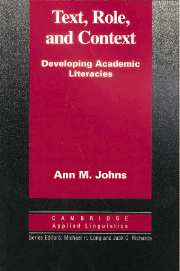Book contents
- Frontmatter
- Contents
- Series editors' preface
- Preface
- Acknowledgments
- 1 Literacy and pedagogy: Three views
- 2 Genre knowledge and socioliteracies: What readers and writers may share
- 3 Genre and social forces: “Homely” and academic texts
- 4 Discourse communities and communities of practice: Membership, conflict, and diversity
- 5 Special roles: Literacy practitioners as campus mediators and researchers
- 6 Students as researchers: Investigating texts, processes, and contexts
- 7 The socioliterate classroom: Basic tenets and goals
- 8 Putting tenets and goals into practice: Using portfolios in literacy classrooms
- 9 Conclusion
- References
- Index
Series editors' preface
Published online by Cambridge University Press: 05 October 2012
- Frontmatter
- Contents
- Series editors' preface
- Preface
- Acknowledgments
- 1 Literacy and pedagogy: Three views
- 2 Genre knowledge and socioliteracies: What readers and writers may share
- 3 Genre and social forces: “Homely” and academic texts
- 4 Discourse communities and communities of practice: Membership, conflict, and diversity
- 5 Special roles: Literacy practitioners as campus mediators and researchers
- 6 Students as researchers: Investigating texts, processes, and contexts
- 7 The socioliterate classroom: Basic tenets and goals
- 8 Putting tenets and goals into practice: Using portfolios in literacy classrooms
- 9 Conclusion
- References
- Index
Summary
This newest book in the Cambridge Applied Linguistics Series is written by a scholar who, for many years, has been at the forefront of efforts to improve the understanding of the complex issues involved in preparing students for successful university studies. Ann Johns redefines the nature of English for Academic Purposes and offers a fresh perspective on a central aspect of this subject – the nature of what she terms academic literacy. The book presents a powerful theoretical framework for understanding the nature of academic discourse and a compelling argument for reexamining assumptions about how academic literacy can be taught.
Further, Johns shows that in order to understand what literacy is one must consider much more than an individual's ability to produce and understand written discourse. Understanding the nature of literacy involves knowing how knowledge is represented in different disciplines and contexts, being familiar with the strategies needed for understanding and organizing texts, knowing the social contexts in which texts are produced and read, being acquainted with the community and culture that produce and value certain texts and types of text, and knowing how previous experiences of literacy shape perceptions and expectations as to the nature of written discourse.
Johns argues that learners acquire literacy in particular social contexts, developing what might be termed socioliterate competence through exposure to the genres specific to those contexts. Writers and readers become part of communities, each with its own rules, norms, conventions, and cultures of literacy. She supports her beliefs by analyzing the assumptions underlying a variety of familiar and not-so-familiar genre types, both academic and nonacademic.
- Type
- Chapter
- Information
- Text, Role and ContextDeveloping Academic Literacies, pp. ix - xPublisher: Cambridge University PressPrint publication year: 1997

